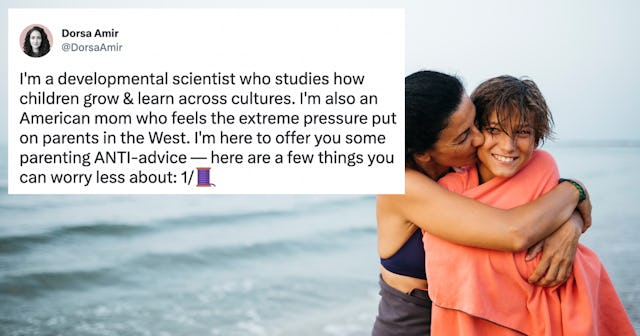A Developmental Scientist Shared Her ‘Parenting Anti-Advice’ And It Went Viral
In a viral Twitter thread, mother and developmental scientist Dorsa Amir calls out the "extreme pressure put on parents in the West."

The internet is saturated with parenting advice, and frankly, it can be overwhelming to see all the ways you can unwittingly inflict harm on your child. There is an immense amount of pressure on parents to always be up-to-date on ways to maximize the smaller and smaller amounts of precious downtime with their children.
This is why developmental scientist and American mom Dorsa Amir is offering a dose of anti-advice for parents feeling societal pressures. “'m a developmental scientist who studies how children grow & learn across cultures. I'm also an American mom who feels the extreme pressure put on parents in the West,” Amir wrote. “[H]ere are a few things you can worry less about.”
The first thing to stop worrying about? Trying to make every moment with a child into a learning opportunity.
“First: not everything has to be ‘educational.’ It's truly completely okay (& indeed, good) for kids to play for the sake of play. They don't have to be learning the alphabet or animal noises. They can just do whatever silly thing they want to do. They are ALWAYS learning!,” Amir wrote, while also noting that “active & direct instruction from an adult is the rarest form of teaching in human history” and that kids learn via observation and are “extremely good at it.”
She also wanted to give parents permission to simply let their kids be bored every once in a while and not see it as some sort of parental failure. “Kids should be allowed to experience boredom. It's part of the human experience & it's okay if they're bored. You do not have to feel obligated to constantly entertain them or provide new activities for them. They should be allowed to generate their own activities & ideas.”
The same goes with letting kids experience and work through social conflict on their own.
“They can disagree or argue with their playmates; that's completely fine & actually very good for them to practice. Let them resolve things if they can, you don't have to get involved or prevent it from happening,” Amir continued.”Negative emotions are not bad and it’s good for kids to experience what they feel like and learn how to process them,” she noted.
Amir lists several other expectations or worries for parents to try to drop, like the pressure to always be on, like the “zany, cartoonish, friend” to a child, to buy “600 toys,” or to shape your life and schedule “100% around your child’s preferences.”
Ultimately, Amir’s thread aimed at deconstructing the narrowly defined expectations about what parents “should” be doing and how a child “should” be growing. “One thing that makes humans extra special is high levels of what we call ‘plasticity’ or, the ability to calibrate to a million different ecological, cultural, & social environments. What this means is that there are a million different ways to be human & they're all valid.
“Your kid eats the same thing at dinner as you? Sure, that makes sense. Your kid gets their own special meal? Great, that's fine too. Does he have 600 toys? That's great. Does he play with kitchen utensils most of the time? Excellent!” she summed up.
The anti-advice clearly resonated with parents feeling the pressure. “I really needed this. My first crack at parenting began when I was an adolescent. Repeat in mid thirties, I am worried often, about repeating mistakes or making new ones. Thank you for the gentle reminders,” replied one parent.
“Those of us on the fence on becoming parents get overwhelmed with the frankly absurd expectations that modern parenting appears to require,” replied another still deciding whether or not to have children.
Parents are only human, and they deserve to give themselves some grace as they continue to grow and raise their children. Amir’s informative thread is an excellent reminder of this.
This article was originally published on